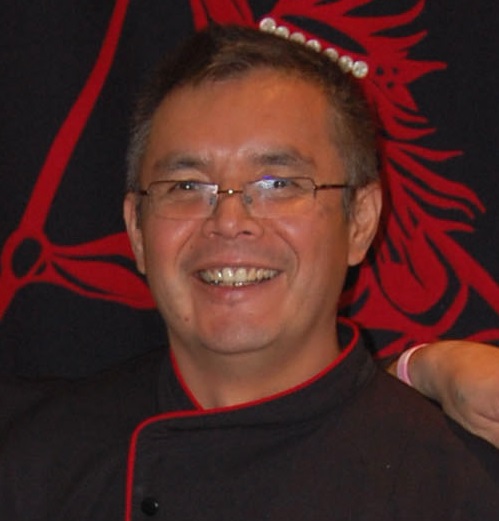
TORONTO—Chef Andrew George Jr. is on a mission to help First Nations students enjoy healthy food and gain an interest in culinary arts.
“When I got into cooking there were only two of us in cooking school here in Vancouver and cooking has done wonders for my life. If you do it right it’s a very rewarding career. The unemployment rate on some of our reserves (is high),” George said.
“That’s all I’m after, is to give our people an opportunity, just like someone gave me an opportunity.”
After a stint at Quillicum Restaurant in Vancouver, where he learned how to cook on a wood-burning grill and prepare other native cuisine dishes, George became the head grill cook at age 23 for the First Nations Restaurant at the Folk Life Pavilion at Expo 86 in Vancouver.
In 1992, he participated in the first all-aboriginal team at the Culinary Olympics in Frankfurt, Germany. There were 13,000 chefs from 52 countries and the First Nations team won seven gold, two silver and two bronze medals at the prestigious event.
“To me, the reason we did that was probably the introduction of aboriginal cuisine to the world because we brought musk ox, we brought caribou, we brought all of that stuff over,” George said by telephone from Vancouver.
He had his own restaurant for five years, cooked at the Four Host First Nations pavilion at the 2010 Winter Olympics in Vancouver and last year became a volunteer chef mentor for SuperChefs, created by a group of dentists at the University of British Columbia to offset childhood obesity by teaching children how to cook.
With all that going on, George also found time to pen “Modern Native Feasts: Healthy, Innovative, Sustainable Cuisine” (Arsenal Pulp Press), a cookbook in which he highlights recipes that combine the use of fresh, local and seasonal products with contemporary ways of approaching traditional aboriginal forms of cooking, such as brining, smoking and curing.
George, a member of the Wet’suwet’en Nation in British Columbia, was born in Smithers in north-central B.C. He grew up with his family taking advantage of what was available in the wild.
He calls it the original locavore diet.
“I grew up off-reserve and having to depend on the land for food, so we followed the seasons. Most of my youth was out in the territories hunting, fishing, trapping and gathering, so taking my experience of a traditional education through my late father, who was hereditary chief, and my mother on how to survive on the land and the local foods based on the fish and the seasons, whether it’s hunting caribou or moose or gathering berries or fishing for salmon … that was the basis for all of us.”
“Modern Native Feasts” features more than 100 recipes for entrees, appetizers, salads and soups that marry traditional ingredients with up-to-date flavours, food trends and techniques.
“What I’m trying to do is educate the general public on principles of cooking and that’s why we start out with stocks,” he said.
“If you can produce a really good stock that’s the basis to all good cooking. … It’s simplistic, but if you do it well it affects everything.”
Specialty shops in most cities sell farmed game animals such as buffalo, caribou and musk ox, while many health-food stores stock ingredients like juniper berries. However, George cites alternatives like beef or veal instead of bison that home cooks can substitute.
As a chef instructor, George says making recipes user-friendly is “just kind of built into me.”
“I took out all the culinary terms and just used plain old English. The methodology steps are pretty straightforward. The recipes themselves are pretty simplistic,” he said.
“The way I look at it and the reason I did it that way is cooking is getting too complicated. People tend to get lost in some of the recipes. So I try to simplify it. As a chef we always say the simpler the recipe the better it is,” he said during a break from teaching a class.
George, 50, recently became a grandfather with the birth of his daughter’s baby. His son, 16, also named Andrew, is training to be a chef. “I call him the new and improved chef Andrew George. He’s younger, faster, stronger.”
He returns home annually, where he and his family fish and pick berries, which are smoked and preserved.
“That’s actually what got me through school, to tell you the truth. Because when we were going through school, living on a student (budget), you’re very poor. So what I did was I survived on canned salmon, canned moose meat, canned berries that came from the land and came from my parents. That’s actually what got all my brothers and sisters through school and myself.”
His first book, co-written with Robert Gairns, was “Feast!: Canadian Native Cuisine for All Seasons” (1997). It was published in a new edition in 2010 as “A Feast for All Seasons.”
George says his next project is a book called “Haute Cuisine,” working with executive chefs in Vancouver and the British Columbia Chefs’ Association. The profits would go toward bursaries for students entering culinary school.
Follow (at)lois_abraham on Twitter.